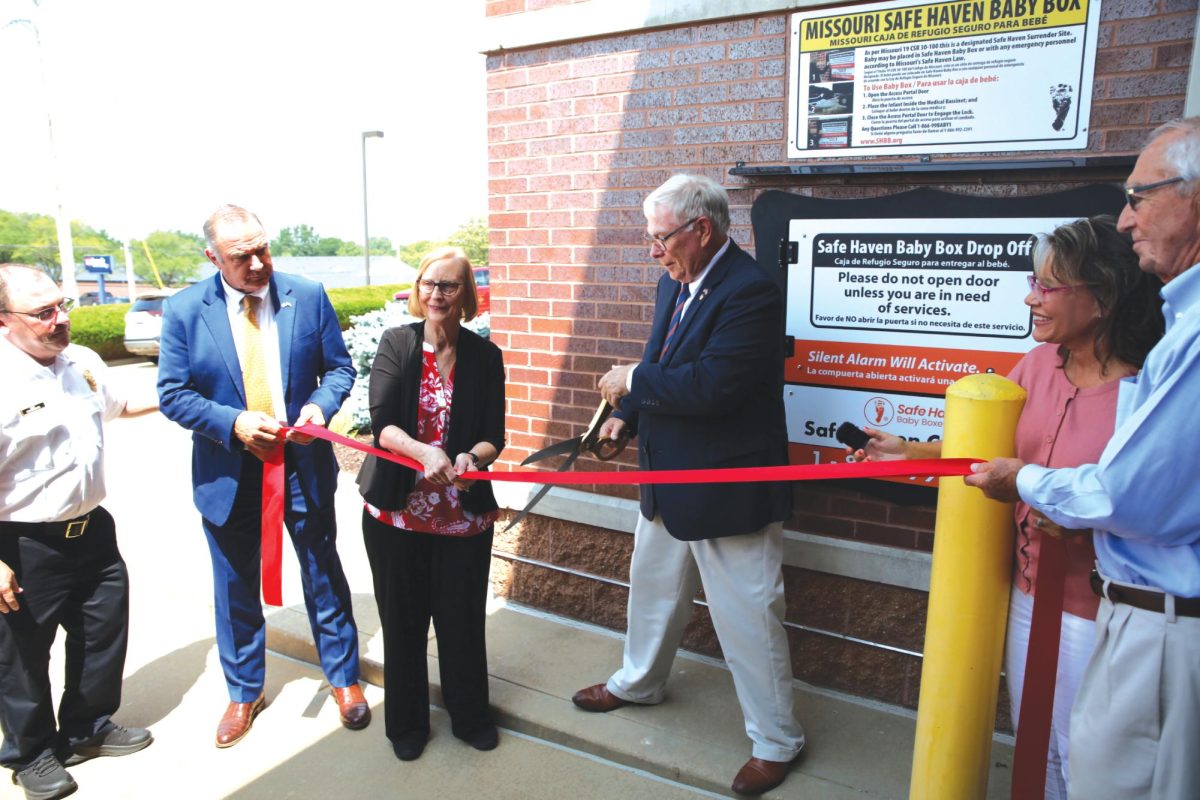The Crestwood Board of Aldermen voted unanimously Tuesday night to select the owner of the former Crestwood Plaza as the preferred developer of the mall property.
The resolution selecting UrbanStreet Group of Chicago as the preferred developer for the redevelopment of the mall site was approved with some amendments after three new board members were seated — Justin Charboneau of Ward 2, Grant Mabie of Ward 3 and Timothy Anderson of Ward 4. The three were elected April 7.
UrbanStreet Group, which submitted the only response to the city’s request for proposals, or RFP, to redevelop the site, is requesting nearly $28 million in tax incentives, including tax-increment financing, or TIF, for a roughly $99.5 million mixed-use project at the 48-acre site at Watson and Sappington roads.
As proposed, the redevelopment would include four components — a retail area, a multiplex theater and restaurants, 225 apartments, and open space and community gardens.
The developer anticipates that a certain amount of the TIF can be repaid from proceeds from a community improvement district, or CID, and possibly an additional amount from a transportation development district, or TDD. Both the CID and the TDD would levy a sales tax of up to 1 percent, according to the proposal.
The board adopted the resolution with amendments suggested by Mabie and Anderson.
While the resolution designates UrbanStreet Group as the preferred developer for the project, the measure states, “Such designation shall terminate if the city and UrbanStreet do not enter into a mutually satisfactory redevelopment agreement with respect to the redevelopment project by July 1, 2016.”
An amendment included by Mabie would allow the board to terminate UrbanStreet’s designation as the preferred developer with a future resolution.
An amendment included by Anderson added language clarifying the Board of Aldermen’s involvement in the process.
The resolution now states, “There having been no prior negotiations between the city and UrbanStreet for a redevelopment agreement, the city staff, after an initial consultation with the Board of Aldermen and thereafter with regular and periodic consultation with the board, is hereby authorized to negotiate a redevelopment agreement between the City and UrbanStreet, which provides for the construction and financing of the Redevelopment Project, including the application of any tax-increment financing assistance or other economic development incentives approved by the Board of Aldermen, and to present such redevelopment agreement to the Board of Aldermen for consideration.”
Mabie added the words “and approval” to the end of this section of the resolution.
Aldermen agreed to delete a section of the measure that would have directed City Clerk Helen Ingold to provide notice to other taxing districts of Crestwood’s desire to convene the city’s TIF Commission. Aldermen will consider that section at a later date.
On April 15, Crestwood officials publicly unveiled UrbanStreet’s response to the city’s RFP, after keeping the plan under wraps for nearly a month.
As first reported by the Call, Lindbergh Superintendent Jim Simpson believes UrbanStreet’s plan to construct 225 apartments at the mall site “is the worst scenario for Lindbergh Schools,” as it would exacerbate the aggressive enrollment growth that already is challenging the school district. Students from those apartments would attend Crestwood Elementary School, which is already at capacity.
Citing a lack of cash registers, Lindbergh officials also are concerned about how the redevelopment will retire the $28 million in tax incentives UrbanStreet is requesting, according to Simpson.
UrbanStreet Group purchased the mall property last year for $2.625 million from Chicago-based Centrum Partners and New York-based Angelo, Gordon & Co., which owned the majority stake in the site. Although the structures on the site were valued at just $1,000 by St. Louis County Assessor Jake Zimmerman last year, the property was valued at $9,849,000.
In an email sent to Lindbergh parents Thursday, Simpson wrote, “ It is essential that every Lindbergh community member — not only Crestwood residents — become informed about this issue, because a residential TIF would send additional students into our already overcrowded schools without any additional funding. Lindbergh’s enrollment is already growing by more than 250 students each year, filling every classroom, closet and nontraditional learning space in our schools. Our district is more than 92 percent locally funded. We simply cannot afford to educate more new students without additional property tax revenue.
“Right now, we need everyone’s support in order to protect the educational excellence that has made Lindbergh the No. 1 school district in Missouri for five years. Please take a few moments to learn more about Crestwood’s redevelopment proposal, and stay informed by visiting go.lindberghschools.ws/mall.”
More than a dozen speakers addressed the Board of Aldermen Tuesday night before the three new board members were seated, with many expressing concerns about how the proposed redevelopment project would impact Lindbergh Schools.
David Reinhardt, a Crestwood resident and Lindbergh parent, said, “ I’m quite active in volunteerism at my daughter’s school and for Lindbergh Schools, so I get to see firsthand the quality educational experience my daughter and the rest of the over 6,000 students receive by the Lindbergh Schools teachers and administration — and frankly by the taxpayers of our school district.
“As most of you hopefully know, it costs a little over $10,000 to educate a student at Lindbergh Schools. Ninety-two percent of that $10,000 is raised locally. The $10,000 per student gets us the No. 1 school district in the state of Missouri, five years running, national Blue Ribbon Awards for the schools, most recently Long and Concord Elementary, and possibly most importantly, Lindbergh Schools helps students become young men and women who are responsible citizens who do their part to ensure the community, their city, their world is a better place.”
Reinhardt said he was concerned about UrbanStreet’s request for nearly $28 million in tax incentives and the 225 apartments and how that could potentially impact Lindbergh Schools.
“ Taking away revenue for what could be up to 23 years from Lindbergh Schools for educating any new Crestwood residents is just not sound, logical reasoning,” he said. “Lindbergh has seen, is seeing and will continue to see student growth — 250 new students a year is what currently comes to Lindbergh, most of which are elementary students. Lindbergh Schools’ educational model is correct and 100 percent on target — proper classroom sizes, individualized teaching methods that benefit all students (and) excellence in teachers and staff who care about each and every child. The qualitative and quantitative evidence is there. It’s clear. It’s transparent and truthful.
“I and many other of the 18,000 residents of the Crestwood and the surrounding Lindbergh community do not want to see this commitment to academic and personal student excellence be compromised because revenue is being diverted from not just schools, but possibly police departments, fire departments and other public-service works.”
Mayor Gregg Roby interjected, “Sir, you have 10 seconds.”
Reinhardt continued, “Mayor Roby and board, please do your due diligence in educating yourselves and the Crestwood community if TIFs, TDDs and CIDs are in your constituents’ best interests Is leveraging tax dollars a gamble, a risk that you want to take on a child’s education? ”
Crestwood resident and Lindbergh parent John Rahoy said, “ My biggest issue is we have a company that bought this property for $17.5 million less than the company before it and yet, we want to consider giving them $28 million to build. I think that is very inappropriate.
“If they want to come in here and build and construct and do what they want to do, then either give them the $28 million, but no apartments or give them the apartments and no $28 million.”
Noting he agreed with Reinhardt, he continued, “It’s a double whammy to the school district. It’s a double whammy to everyone that is involved in the school district. And although that is not your priority No. 1, it should be considered, and I don’t understand the issue with saying, ‘We’re going to give you everything you want, just because people perceive us to be desperate to redevelop that property.’
“So I’m asking you to consider what I’ve just discussed — that we have a company that has bought this for next to nothing considering what business they’re in, and I think you ought to consider seriously giving them an option or at least having them come back with something different. Please do not just accept this initial proposal. I think it’s not a wise decision ”
Resident Carol Wagner, who served on the city’s TIF Commission for the redevelopment of Watson Plaza, discussed the process for granting TIF assistance to a developer.
“I would like a clarification of this — the TIF. It’s my understanding that a developer can’t just come and ask for TIF and it’s up to you guys to decide whether or not to give it to them,” she said. “That a TIF Commission has to be formed. That St. Louis County is involved in the TIF Commission and all matters are weighed out carefully before any amount of money is given to any developer and it’s done on needs
“So I think sometimes people are getting more overworked about a TIF when they really don’t, in my opinion, understand that it’s a long process.”
Resident Kathryn Brandt, whose home backs to the mall site, said she is anxious to have the property redeveloped, but urged aldermen to take their time in moving forward.
“ While I care greatly that it is redeveloped, I would ask you guys to consider taking time. If feels very rushed, and it feels like you guys are rushing into a decision without a lot of information. And I just moved here in June of 2014. I’ve jumped in ,” she said, noting she serves on the city’s Beautification Committee.
“ I have a very vested interest. I want to be here until I die. I never want to move, but I really don’t want to see a halfway thought-out plan be built behind my house because it’s not going to do any good in the long term. And I’m not sure that the plan that they’ve proposed is all the way great, and I know none of you really do yet either.
“But I feel like it’s being ramrodded through. I feel like it’s being rushed, and while I very much don’t like an empty mall, I don’t want to see an empty development that we paid a lot of money to bring into this community. So please just take your time,” Brandt said.
Taking the oath of office Tuesday night with Charboneau, Mabie and Anderson was Ward 1 Alderman Darryl Wallach, who was unopposed in the April 7 election.
Charboneau defeated longtime Ward 2 Alderman Tim Trueblood, while Mabie was unopposed to fill the seat vacated by Ward 3 Alderman Paul Duchild. Duchild, who served two terms, did not seek re-election.
Anderson defeated former Alderman Deborah Beezley for the seat being vacated by Alderman Mike Vincent. Vincent was appointed to the seat last year after Alderman Dan Tennessen resigned.
In a separate matter, aldermen elected Ward 2 Alderman Mary Stadter to serve as board president.
A resolution selecting the owner of the former Crestwood Plaza as the preferred developer for the redevelopment of the mall property was scheduled to be considered earlier this week by the Crestwood Board of Aldermen.
The Board of Aldermen was set to meet Tuesday night — after the Call went to press.
The resolution selecting UrbanStreet Group of Chicago as the preferred developer for the redevelopment of the mall site is scheduled to be considered after new board members are seated, according to the meeting agenda.
Ward 1 Alderman Darryl Wallach was unopposed in his re-election bid in the April 7 election, while Grant Mabie, who serves as chairman of the city’s Economic Development Commission, was unopposed to fill the seat vacated by Ward 3 Alderman Paul Duchild. Duchild, who served two terms, did not seek re-election.
In Ward 2, Justin Charboneau defeated longtime Alderman Tim Trueblood. In Ward 4, Timothy Anderson defeated former Alderman Deborah Beezley for the seat being vacated by Alderman Mike Vincent. Vincent was appointed to the seat last year after the resignation of Alderman Dan Tennessen.
UrbanStreet Group is requesting nearly $28 million in tax incentives for a roughly $99.5 million mixed-use redevelopment of the 48-acre former mall property at Watson and Sappington roads.
As proposed, the redevelopment of the former mall property would include four components — a retail area, a multiplex theater and restaurants, 225 apartments, and open space and community gardens.
If approved, the resolution would designate UrbanStreet Group as the preferred developer for the project. “Such designation shall terminate if the city and UrbanStreet do not enter into a mutually satisfactory redevelopment agreement with respect to the redevelopment project by July 1, 2016,” the measure states.
The resolution also would authorize city staff to negotiate a redevelopment agreement between the city and the developer, “which provides for the construction and financing of the redevelopment project, including the application of any tax-increment financing assistance or other economic development incentives approved by the Board of Aldermen and to present such redevelopment agreement to the Board of Aldermen for consideration.”
In addition, the measure would direct City Clerk Helen Ingold to provide notice to other taxing districts of Crestwood’s desire to convene the city’s Tax-Increment Financing, or TIF, Commission.
Crestwood officials on April 15 unveiled UrbanStreet’s response to the city’s request for proposals, or RFP, to redevelop the mall site, after keeping the plan under wraps for nearly a month.
As previously reported by the Call, Lindbergh Superintendent Jim Simpson believes UrbanStreet’s plan to construct 225 apartments “is the worst scenario for Lindbergh Schools,” as it would exacerbate the aggressive enrollment growth that already is challenging Lindbergh. Students from those apartments would attend Crestwood Elementary School, which is already at capacity.
Citing a lack of “cash registers,” Lindbergh officials also are concerned about how the redevelopment will retire the $28 million in tax incentives UrbanStreet is requesting, according to Simpson.
UrbanStreet Group purchased the mall property last year for $2.625 million from Chicago-based Centrum Partners and New York-based Angelo, Gordon & Co., which owned the majority stake in the site.
Although the structures on the site were valued at just $1,000 by St. Louis County Assessor Jake Zimmerman last year, the property was valued at $9,849,000.
“Based upon the estimated project costs of nearly $100 million, and in order to provide a reasonable return to the developer so that the project can even begin, the developer believes that TIF incentives are necessary,” UrbanStreet’s proposal states.
The developer also anticipates that a certain amount of the TIF can be repaid from proceeds from a community improvement district, or CID, and possibly an additional amount from a transportation development district, or TDD.
Both the CID and the TDD would levy a sales tax of up to 1 percent, according to the proposal.
A March 24 public-records request by the Call for UrbanStreet’s RFP response — or a redacted copy of the response — was denied on March 27 by Ingold, who cited two Sunshine Law exemptions she said permitted the document to remain closed.
“… Under Section 610.021(12) the record as a whole is exempt, and there is no material to be redacted,” she wrote. “For your information, it is anticipated that the document you request will … become public when presented at a Board of Aldermen meeting for discussion, which the city administrator has informed me he currently expects could be in April 2015.”
Section 610.021(2) involves, “Leasing, purchase or sale of real estate by a public governmental body where public knowledge of the transaction might adversely affect the legal consideration therefor …”
Section 610.021(12) involves, “Sealed bids and related documents, until the bids are opened; and sealed proposals and related documents or any documents related to a negotiated contract until a contract is executed or all proposals are rejected.”










